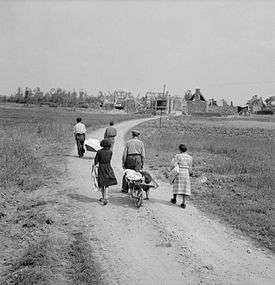Post-war
A post-war period or postwar period is the interval immediately following the end of a war. A post-war period can become an interwar period or interbellum, when a war between the same parties resumes at a later date (e.g., the period between World War I and World War II). By contrast, a post-war period marks the cessation of conflict entirely.
In Western usage, the post-war era or postwar era (sometimes capitalized) is the period of time since the end of World War II, although many nations involved in the Second World War have been involved in wars since.
Post-war
Chronology of the post-World War II era
The term "post-war" can have different meanings in different countries and refer to a period determined by local considerations based on the effect of the war there. In Britain, "post-war" refers to the period from the election of Clement Attlee in 1945 to that of Margaret Thatcher in 1979, a period of so-called post-war consensus, while it may also refer to a shorter period, ending in 1960 or shortly after and corresponding to the 1950s era.[1][2][3]
Cold war era
Considering the post-war era as equivalent to the Cold War era, post-war sometimes includes the 1980s, putting the end at 1990, when the USSR collapsed.[4][5] The 1990s are rarely considered to be part of the post-war era.
See also
- Interbellum (disambiguation)
- Interwar
- Post 9/11 era
- Postbellum
- Pre-war (disambiguation)
- Reconstruction Era of the U.S.
References
- ↑ AEC Lorries in the post war years 1945-1979 book (09/10/2011)
- ↑ The Post-War Years 1945 - 1960
- ↑ The Post War Economy: 1945-1960
- ↑ http://www.letsgo.com/12350-europe-travel-guides-the_netherlands-history-c
- ↑ Charting Europe's Future in the 'Post Postwar' Era. - Soap Box Discussion Forums and Messageboard - Home of the Patrioteer
| Look up post-war in Wiktionary, the free dictionary. |
